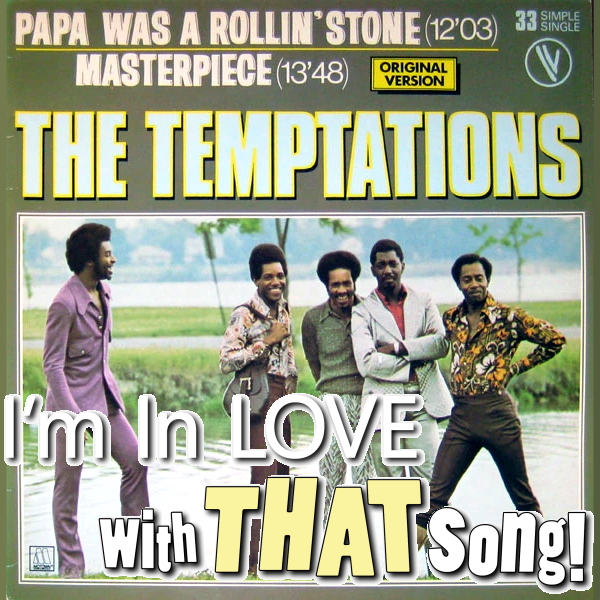Norman Whitfield turned The Temptations from a typical Motown vocal group into Psychedelic Soul pioneers. Their collaboration reached its zenith with “Papa Was A Rolling Stone“, a dark, atmospheric, orchestral showcase for both the Temptations and Whitfield’s genius. This would be the last #1 hit for The Temptations, and they would stop working with Norman Whitfield soon after. But they left behind this monumental masterpiece.
“Papa Was A Rolling Stone” (Norman Whitfield & Barrett Strong) Copyright 1972 Stone Diamond Music Corp.
If you enjoyed this episode, here’s a previous episode that featured another classic Temptations song:
lovethatsongpodcast.com/the-temptations-i-cant-get-next-to-you/
— And remember to follow this show, so you never miss an episode.
TRANSCRIPT:
You have managed to find your way to the “I’m In Love With That Song Podcast, one of the many shows on the Pantheon Podcast Network dedicated to bringing you the best music-related podcasts. I’m your host Brad Page, and each episode of this show, I pick one of my favorite songs and we attempt to discover what makes it a great song. Musical knowledge or experience is not a prerequisite here, we don’t get technical. This show is for anybody who loves music.
On this edition, we’re taking a look at one of the most epic songs to ever hit Number One, and probably the most unconventional track that Motown ever released. This is the Temptations with “Papa Was a Rolling Stone”.
Barrett Strong and Norman Whitfield were one of Motown’s most successful songwriting teams. Whitfield was also their most adventurous producer. He was the man credited with creating the sound of “psychedelic soul”. Whitfield and Strong wrote “Papa Was A Rolling Stone” sometime in 1971. Whitfield had composed the music and recorded a basic track, and gave the tape to Strong with the suggestion that he come up with some lyrics that were fun. But as Strong listened to the tape over and over, he heard it differently. In particular, he thought that the bass part sounded like someone struggling to make sense out of confusion. He started to think about kids he knew who had been abandoned by their fathers. When they asked their mother what happened to their dad, what would they say? So Strong ran with that idea, finished up the lyrics and presented them to Whitfield, who liked them.
So they completed the song and then set about recording it with a band called The Undisputed Truth. It was this version that was released as a single in early 1972.
[Music]
That’s actually a pretty cool production, but it wasn’t a hit. Whitfield still believed in the song though, and he convinced Barry Gordy to let him have another crack at it. So Whitfield completely reworked the song and went back into the studio with Motown’s legendary Funk brothers and rerecorded it. They turned it into an epic twelve-minute instrumental, a track full of atmosphere. Whitfield brought in Paul Riser to arrange the strings. Riser thought the track was full of mystery and suspense, and he treated his arrangement like he was scoring a movie. The soundtrack to “Shaft” had come out a year before, and Reiser was definitely inspired by that.
Now here’s where the Temptations come in. By 1971, The Temptations had gone through some major changes. Paul Williams and Eddie Kendricks had left, leaving Otis Williams, Dennis Edwards and Melvin Franklin to carry on with two new members, Richard Street and Damon Harris.
The Temptations had had quite a few hits with Norman Whitfield producing, including two number ones. One of them, “I Can’t Get Next To You”, we covered here back in episode number 45.
But the Temptations were growing tired of Whitfield’s experimentations, which made the guys feel more like bit-players on their own records. They wanted to return to the romantic numbers like “My Girl” that they used to do. So, when Whitfield brought them into the studio and played them the twelve-minute track to “Papa Was a Rolling Stone”, they said, “No way, we are not doing that”. They argued for about 20 minutes when the group’s leader, Otis Williams, finally said, “Okay, we’ll give it a try”.
So let’s get into the track. Now, usually my preference is to go with the album version rather than the single, but this time we’re going to go with the single. The album version, at twelve minutes long, is a bit much for this podcast, and considering that the single itself is seven minutes, that gives us plenty to work with.
Here’s how the track begins. Just bass and hi-hat. Let’s hear just the bass, because that’s really the heart of the song.
The next thing you hear are the strings arranged by Paul Reiser. They add some real drama to the song. You can hear how Reiser was orchestrating this like a soundtrack to a movie, rather than just a pop song.
Here come the guitars, played by Paul Warren and Wah-Wah Watson. The two guitar parts play off each other and all the other instruments throughout the whole song. They’re always doing something interesting.
Added here, a trumpet played by Maurice Davis. Davis had already finished recording his part and was on his way out when Norman Whitfield called him back into the studio. He wanted to try recording it with a heavy echo on it. So, Davis re-recorded his whole part using the echo, which adds another layer of spookiness to the song.
Hand claps on the off beats. Notice how the hand claps stop there? The wah-wah guitar flutters and then the harp comes back in. All these parts flowing in and out. The wah-wah guitar drops out, the strings build and then drop out, too.
We are 1 minute and 55 seconds into the song, and here is where the vocals finally come in. On the album version, it’s almost four minutes before the vocals come in. You can see why The Temptations felt like they were being sidelined, but that intro really sets a mood, doesn’t it?
We’ll take a look at the vocals in a minute, but first, let’s just listen to what those guitars are doing in the background.
The Motown guitar players were usually relegated to just playing rhythm, but here they get to stretch out a bit.
Now the vocals. The first voice we hear is Dennis Edwards. Edwards and Whitfield clashed from the start about this song. Edwards kept trying to put more into his vocal performance, but Whitfield kept telling him to hold back, to tone it down. Edwards did not like to be restrained, but Whitfield wanted it dialed way down. That was making Edwards pretty mad. But Whitfield got the take he wanted.
Edwards was also upset because he was taking the lyrics a little personally. This verse about the 3rd of September being the day that Daddy died hit a little close to home. Now, the legend has it that Edward’s own father died on September 3, but that’s not actually true. His dad died on October 3. Still, it was close enough for Edwards to be concerned about it. And Whitfield had to convince him that it wasn’t personal. Barrett Strong had only written the lyrics that way because he liked the way it sounded–the date was purely a coincidence.
Let’s hear more of the guitars behind this verse.
Here come those hand claps again.
Maurice Davis’s trumpet, saturated with echo, appears again. The strings are going to take over for a few measures. Let’s hear what they’re doing. Reiser used nine violins, four violas, three cellos, and that harp for the string section.
In classic Temptations fashion, the lead vocals are shared by different singers. This works particularly well on this song, because it sounds like multiple children telling their stories. It’s not just the story of one boy, it’s the voices of all those kids who were let down by their fathers.
This next verse features Richard Street, who replaced Paul Williams in 1971, as well as Melvin Franklin, whose deep bass voice was the foundation for so many great Temptations songs.
I love that part.
Let’s zero in on Richard street’s vocals.
Wah-wah Watson is getting in some licks behind this verse. Let’s hear some of that.
And here’s the second chorus.
I like that guitar lick there. The final verse features Damon Harris, who replaced Eddie Kendricks when he quit in ‘71. Harris was the youngest member of the band, and while Kendrick’s falsetto was one of the Temptation’s trademarks, Damon sounds great here.
Damon gets the last word.
Let’s listen a little more to that backing track.
“Papa Was a Rolling Stone”. During their career, The Temptations had four number one hits on the top 100: “My Girl”, “I Can’t Get Next To You”, “Just My Imagination” and “Papa Was A Rolling Stone”. Three of those four were written by Norman Whitfield and Barrett Strong, and produced by Whitfield.
That was a magic combination, but it didn’t last. Within a few years, Whitfield and The Temptations would stop working together, and Whitfield would leave Motown. “Papa Was A Rolling Stone” would be the last number one hit for The Temptations, but it was their crowning achievement.
Thanks for listening to this edition of the “I’m In Love With That Song” podcast. New episodes are released on the 1st and the 15th of every month, so we’ll be back soon with another show. You can find all of our previous shows on our website, lovethatsongpodcast.com, as well as on Spotify, Apple, Podcasts, Google, Amazon, wherever you can find podcasts. And if you’re looking for more music podcasts, check out the other great shows on the Pantheon Network.
Drop us a line on Facebook, Podchaser, or send email to lovethatsongpodcast@gmail.com.
Don’t forget to support the artists you love by buying their music. And thanks for joining me for this episode on “Papa Was A Rolling Stone” by The Temptations.


 Click here to play the episode
Click here to play the episode